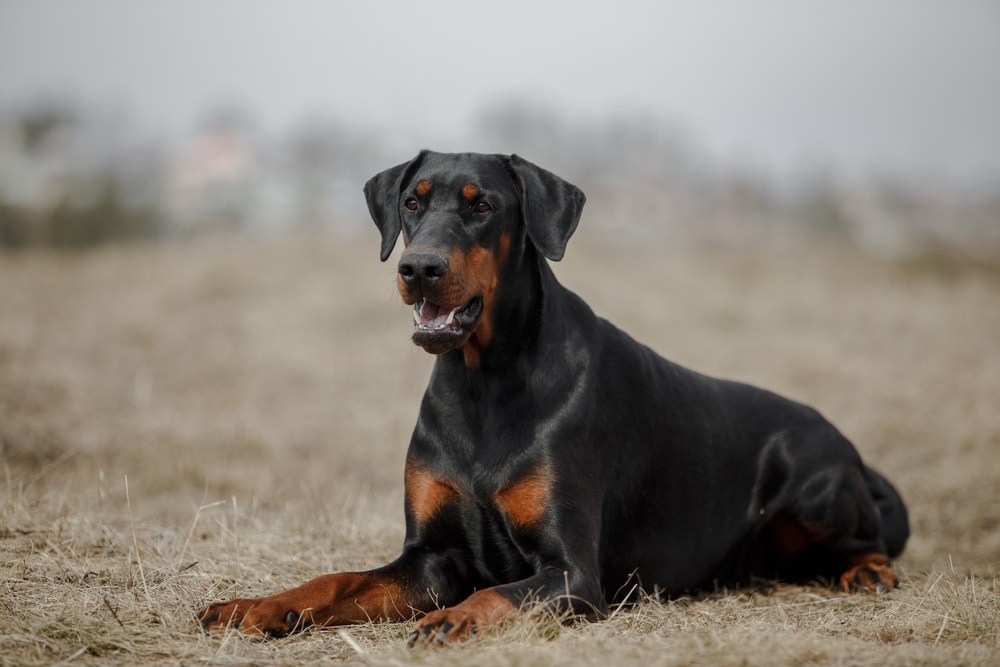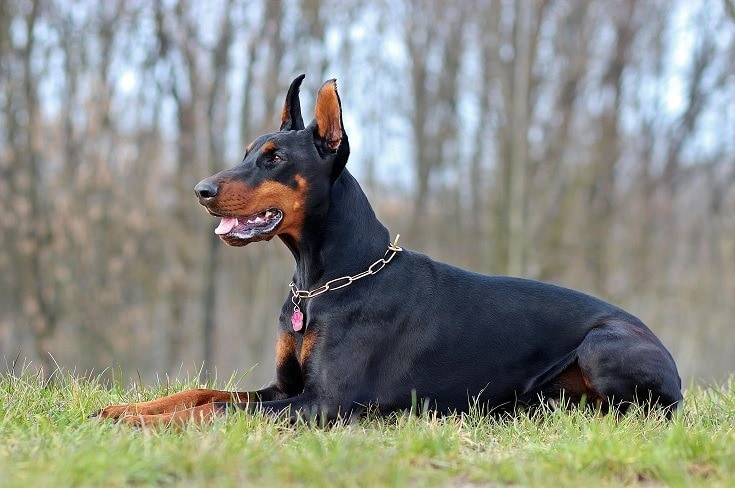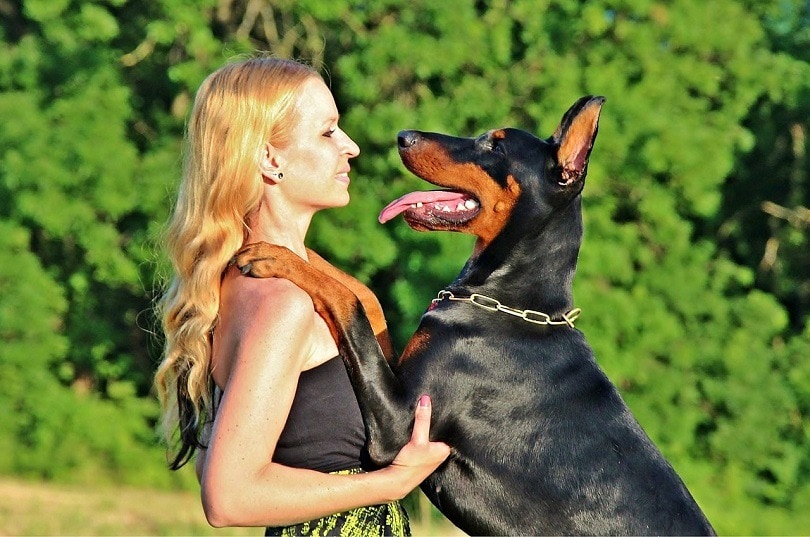Are Dobermans Aggressive? Everything You Need to Know!
Updated on

Dobermans are handsome and devoted dogs that grab everyone’s attention wherever they go. But Dobermans also come with a reputation for being rather aggressive and scary dogs. It doesn’t help when they are shown in TV shows and movies as being evil and vicious dogs. But are these portrayals accurate? Are Dobermans aggressive dogs?
Dobermans were bred as protectors, which means they were bred to be intimidating guard dogs. However, with the right upbringing and socialization, Dobermans are just as sweet and gentle as any other breed.
Here, we delve into the world of the Doberman and give you more information on the temperament of this fantastic dog. We also go over what steps you should take if your Doberman does have aggressive tendencies.
A Little on the Doberman’s Origins
Doberman Pinschers have their origins in Germany in the 1890s. Louis Dobermann was a tax collector and dog breeder and took it upon himself to breed a devoted and dependable dog as a protector while he made his rounds. Apparently, it was a dangerous business collecting taxes from citizens at that time.
The original Doberman was larger and more aggressive than the breed today. It’s thought that the Black and Tan Terrier (an extinct breed that was an early terrier), Rottweiler, German Pinscher, and a few smooth-coated herding dogs were used to create the new Doberman breed.
Dobermans eventually gained recognition for being excellent working dogs. They have been used in the military and with the police, as well as therapy and service dogs and in search and rescue. Today, the Doberman is the 16th most popular dog breed in the U.S.

Are Dobermans Aggressive?
Dobermans today are quite different from the original breed in 19th-century Germany. Modern breeders have worked to breed out the aggressive traits, which has given us a more family-friendly dog that maintains a devoted yet still protective nature.
Dobermans are now bred as companion dogs, and while they are gentle and loving with their owners, they will defend their family and territory. This doesn’t necessarily mean all Dobermans are aggressive, but in most cases, it is likely to be defensive behavior.
A 2021 study looked at what dog breeds tended to be more aggressive. Doberman Pinschers didn’t make the list, but Rough Collies, Miniature Poodles, and Miniature Schnauzers were at the top as the breeds with the highest odds of aggressive behavior.
The study also found that smaller dogs had a higher probability of aggressive behavior compared to medium and large dogs.
The Doberman’s original purpose is what has given them their reputation for being aggressive, but the aggression of any dog breed is dependent on the environment in which they were raised and trained and how well socialized they were.
Do Dobermans Make Good Family Dogs?
Dobermans make excellent family dogs but aren’t the right breed for beginners. They are devoted and intelligent dogs that take quite well to training but have strong personalities.
While these dogs are wonderful with children, kids must be taught to treat all dogs with respect. Young children should never be left alone with any dog, regardless of the breed and no matter how trusted the dog is.
Dobermans are generally happiest when given a job to do, and they are incredibly focused and clever. Their natural instinct is to warn off any intruders from their territory.
They also need a great deal of exercise because they are athletic and energetic and need an owner who can keep up with them. Without the proper outlet for this energy, they can become destructive and are known to be quite unmanageable without the right training and upbringing.
Dobermans form strong bonds with their family and are likely to develop separation anxiety when they are left alone for long periods.
A combination of not enough exercise, both mental and physical, and not spending enough time with them can definitely lead to a dog with behavioral and aggression problems.
The Importance of Socialization
Beyond providing exercise and love, socialization is one of the most essential aspects of raising any dog, let alone a Doberman.
Socialization should start early; puppies must be introduced to as many new people, animals, environments, and scenarios as possible. Otherwise, puppies will grow up fearful, and a scared dog is much more likely to lash out violently when uncertain or stressed.
While it’s critical to start the socialization process with a Doberman while they’re a puppy, adult dogs can still be trained and socialized. It’s never too late!
One way to introduce a puppy or adult dog to socialization can be in conjunction with obedience classes. This way, the dog will meet many new people and dogs while receiving much-needed training.

Are Dobermans Aggressive Toward Strangers?
If they have been socialized well, Dobermans are not aggressive toward random strangers. That might change if the stranger is an intruder. But for the most part, Dobermans aren’t aggressive so much as they are aloof.
Dobermans are naturally reserved around people they don’t know but will become more friendly and relaxed over time.
Are Dobermans Aggressive Toward Other Dogs?
This depends on the Doberman’s training and socialization. Most Dobermans tend to get along well enough with dogs of the opposite sex, but there can be aggression toward dogs of the same sex.
It takes a great deal of dedicated time and training to ensure that your Doberman gets along well with other dogs.
What Are the Triggers for Aggressive Behavior?
Here are the most common reasons that dogs exhibit this behavior.
- Territorial: This is definitely one of the most common reasons for Dobermans to appear aggressive, and anyone approaching their home and property will be on the receiving end.
- Protective: This is a common trigger for Dobermans, as they will show aggression toward any animal or person threatening their family. This also includes female dogs protecting their puppies.
- Resource Guarding: This is the perceived threat of someone taking away something of value to the dog. It’s commonly seen for food but can also be seen for a dog’s toys.
- Predatory: Dogs bred for hunting might experience this form of aggression as a need to hunt and kill something.
- Pain: Some dogs will become aggressive when they are in pain or feeling discomfort.
- Fear and Anxiety: When a dog is afraid, it’s quite common for them to lash out when they feel cornered or trapped.
- Sexual: This is usually directed at a dog of the same sex, such as competition between two males for mating rights with a female.
- Frustration: If a dog has difficulty reaching the object that caused the aggression, they might lash out at another person or animal close by. It is also called redirected aggression.
- Disease/Health: Sometimes, aggression can be a symptom of certain health conditions and diseases.
What Are the Signs of an Aggressive Dog?
Most of the time, you’ll instantly recognize when your dog is displaying aggression. That said, a few signs can occur before the aggression is apparent:
- Licking the chops and yawning
- Avoiding eye contact (by turning the body or head away from the threat or squinting)
- Lowering the body, crouching, and tucking the tail under the body
- Freezing
- Growling
- Snapping
- Biting

How to Handle a Doberman’s Aggression
If your Doberman has shown aggression at times, you first need to determine what is triggering it. For example, if your Doberman primarily displays aggression toward guests, it might be their natural protective instincts kicking in.
That said, you should first bring your Doberman to the vet to rule out any health issues that might be causing their aggression. You can also work with an animal behaviorist or trainer, who can give you tips on the best ways to handle your dog’s aggression.
Even if health issues have been ruled out, you should still seek advice from your vet. They might also be able to recommend a good behaviorist who specializes in your Doberman’s specific issues.
For some dogs, their aggression might be treated with the combination of modifying their environment and behavior in addition to giving them medication.
Summing Up
Dobermans have come a long way since their original job as protectors of tax collectors. They are far less aggressive than many other breeds, but the perception that Dobermans are vicious is probably here to stay for a while due to the ongoing use of this breed as frightening and evil dogs in the media.
A Doberman raised with a strong and loving owner who ensures that they get enough physical and mental exercise and plenty of socialization will end up being an affectionate, devoted, and well-balanced family dog.
Featured Image Credit: elis aksenova, Shutterstock












